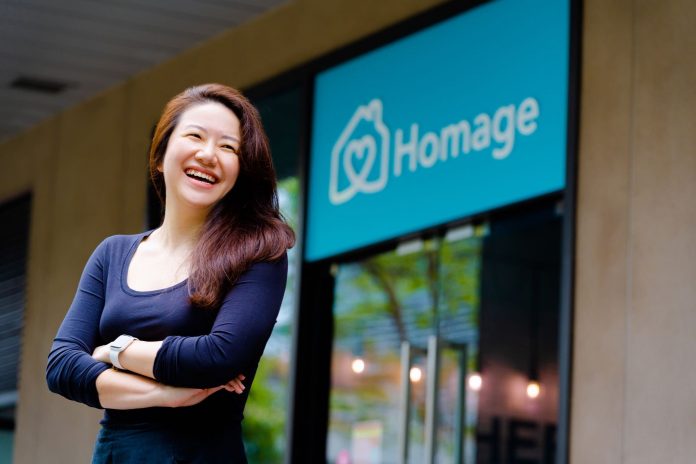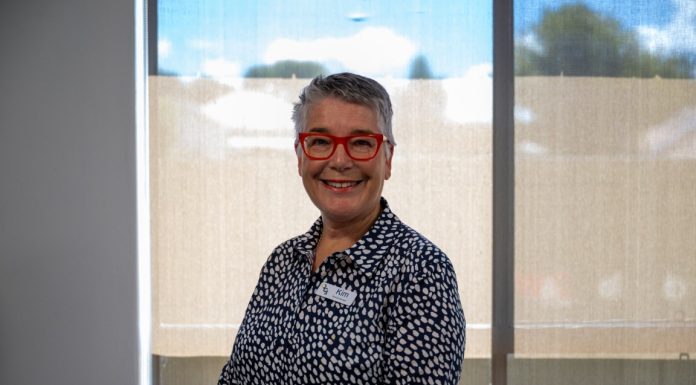Ms Gillian Tee is the Chief Executive Officer and Founder of Homage, a technology-led health and caregiving solution that combines professional caregivers, therapists and clinicians with smart technology to provide holistic care to families wherever they are.
Prior to Homage, Ms Tee co-founded Rocketrip, a Y-Combinator, Google Ventures and Bessemer Ventures-backed technology company based in New York City. Ms Tee has also held various leadership positions at Amazon and Accenture.
Homage is a technology-enabled caregiving and health solution that combines curated professional caregivers, therapists and clinicians with technology to provide holistic care and wellness to older adults and families wherever they are. With more than 6,000 licensed care professionals, Homage leverages its technology platform to provide non-medical and medical services to an expansive client base of government providers, federal care plans, health organisations and employers across Singapore, Malaysia, Japan and now Australia.
Inside Ageing (IA): Congratulations on the completion of your latest funding round. We’ve noticed that you’ve also just opened an office in Melbourne that would indicate a significant move into the Australian market. What can you tell us about that?
Gillian: Our mission is to provide accessible, affordable and highly personalised care solutions for older adults and the chronically ill. We hope to play a strong supportive role alongside the government’s recently announced aged care reform initiatives.
We see that there are strong opportunities to build partnerships in the long term and aged care sectors across various states in Australia and we can play a part in providing a scalable, highly curated solution with strong investment in the engagement, upskilling, screening and curation of care professionals.
The problem space of long term care, in general, can be better solved with technology enablement, where we are looking to better support our care workers and their needs, combining models of longer-term work assignments with flexible work to enlarge and grow a vibrant, dignified pool of carers in our operating states.
IA: For the Australian aged care sector there are chronic staffing issues impacting home care and residential aged care. How has Homage technology worked in Singapore and Malaysia and what type of outcomes have you seen there?
Gillian: The aged care sector has seen challenges that are faced globally, including the need to expand the pool of trained carers as well as better assign and mobilise carers based not only on their skill sets, experience, availability and preferences but also on the care recipient’s unique needs.
We have seen a need to adopt technology in a way that helps individuals better navigate their care needs and set up care plans that then lends itself to how they are matched with best-suited carers. Also, we have seen how technology can be used to better enable and support the carers to learn about the care recipient’s care profile, background and history of care ahead of time so they do not start care support in the dark and are better equipped and set up to do well.
IA: Are you seeing comparisons in the problems faced by Australia and other countries you are operating in when it comes to aged care?
We see the same challenges across the board brought on by a fast-growing ageing population and a corresponding rapid rise in chronic support needs for seniors. In particular, common gaps in the long term care infrastructure includes care navigation as well as a need to enable higher utilisation and professionalisation of non-medical care workers.
Generally, we also see the need for higher accessibility to a holistic solution that can support not only in service delivery but also care planning and assignment of the best-suited providers for a given set of personalised needs across all the markets we operate in.
These problems are not specific to any market we’re operating in. With our care professional curation process and proprietary matching algorithm, we hope to alleviate the burden of navigating and selecting care providers from our Australian customers, allowing them to focus on the needs of their care recipients.
IA: We’ve noticed that Homage has recently expanded into the telehealth space with the launch of Homage Health. For home care and community care do you see this approach as being a significant disruptor to the current in-person approach? I know it’s early days, but is there any data available currently to predict its impact?
Gillian: Seniors, in particular, can face challenges accessing professional medical consultations in hospitals and clinics due to a lack of mobility and dependency on family members. This challenge is more apparent in the present time where the more vulnerable of our community is advised to practice social distancing and lower the risk of infection.
Our goal is to offer a complete range of non-medical caregiving and medical services for seniors to enable them to live well where they are. We believe it is key to focus on the holistic needs of our loved ones, which combines both social support and everyday living physical assistance with medical and health needs.
We have seen fast adoption of our medical services during this time and will look to continue enabling our care recipients to access digital health solutions alongside the need for in-person care when needed to achieve our mission to enable wellness and recovery through holistic care.
IA: This is not your first business, with success in co-founding Rocketrip – a US-based ticketing platform to help businesses reduced travel costs, which attracted funding from the likes of Google and Bessemer Ventures. How does launching into the Care space compare? Did you need to approach things differently?
Gillian: There are parallels where both spaces have a large volume and range of solution providers, bringing with it immense opportunities to establish partnerships within.
Also if you look at it from the perspective of the customer journey, both the business traveller and the care recipient have multiple touchpoints with different providers — from gaining funding approvals to booking services and performing claims — in each step taken to meet their needs.
So along with the fragmentation of the care space, I believe it is key to take on an ecosystem view as a solution provider analogous to the way we approached the business travel space, where stronger collaboration and integration can lead to the unlocking of values for all stakeholders. I am of the mindset that traditional wall gardens and barriers can be removed to build strong partnership ties, resulting in higher value and benefits to all parties in the space — from customer to payor and provider.
Beyond that, there were fundamentals of technology entrepreneurship and building a scalable business that are generally sector-agnostic and translates across both business travel and long term care.
IA: We’ve noticed a lot more activity with respect to new businesses and entrepreneurs entering the care space. What’s your advice to anyone considering a launch in the care sector?
Gillian: I would say it’s important to make sure that along with a strong sense of purpose that there is a steadfast resolve and willingness to commit to building care solutions that can make an impact in the long haul.
It’s generally known that entrepreneurship requires a high level of resilience and a strong connection to the cause. But I would say this is, even more, the case for entrepreneurs in the care space, seeing long term care requires patient solutions that can make material and quality changes over time. Passion, purpose and grit are essential for any entrepreneur, particularly so in the care sector!
IA: Thank you.










